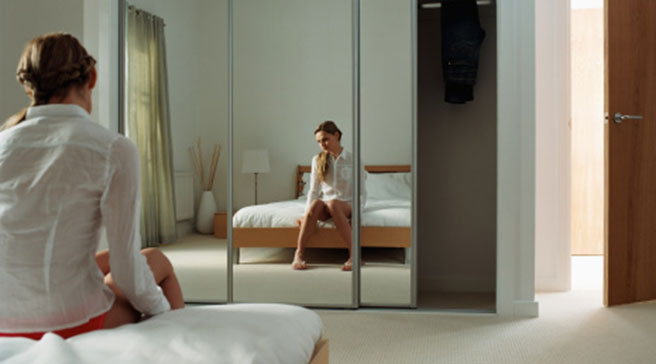What’s your body image script?
Emma Woolf believes the way we talk about our bodies has a deeply corrosive effect on the way we feel about them. So how do we approach the sensitive issue of size and shape? And could changing the body-script help us reach a happier relationship with the way we look?

There’s no doubt we’re in a mess when it comes to fat and thin. Think of the casual, abusive terms we use for our own bodies: jelly belly, muffin top, bingo wings. Fairly light-hearted, you might think, but is it really funny?
As well as our negative inner monologue, and our self-critical shared dialogue, we’re surrounded by linguistic reminders that we are at war with our ‘excess’ flesh. If we aren’t engaged in the ‘battle of the bulge’ we’re being urged to ‘conceal’ and ‘correct’ flaws; to ‘attack problem areas’ and ‘fight the flab’. The language of male bodies focuses on building strength, sculpting muscles and boosting endurance, whereas women are always trying to reduce, to slim down, to diminish…
There is a near-universal acknowledgement among women that a different body is a better body, from those of us who would simply like to be more toned and a few pounds lighter, to those who avoid looking at themselves in the mirror, or never walk around in front of their partner naked, to those who actively hate their bodies, deny themselves food when hungry, or binge-eat in secret. We discuss our weight constantly, and we believe our lives would be better if we could shift the unwanted body-fat.
It is more difficult, and more daring, to say that you’re happy with your body than it is to dislike it. Remember the furore when the journalist Samantha ‘why women hate me for being beautiful’ Brick said she liked the way she looked (she received more than 5,000 abusive messages).
A recent survey found that 77 per cent of British women hate their stomachs. And 82 per cent say their hips are too big. A sizeable minority of women value thinness almost more than life itself: nearly one in three would be willing to die younger in exchange for the ‘ideal’ figure, according to a Succeed Foundation survey in 2011. Fat or thin, insecure or confident, young or old, we all have body hang-ups.
But in my experience, losing weight is not the route to happiness. Thinner does not equal happier. Anorexia taught me that love and family are infinitely more precious than the shrinking number on the scales. Remember the saying: treat others as you would be treated? Well, how about this: treat yourself as you would treat others? A little kindness and respect when we talk about our own bodies could go a long way.
More inspiration:
Read Anorexia – the hunger heroin by Susannah Hebden Moore on LifeLabs








